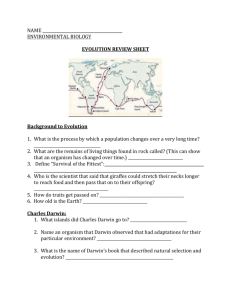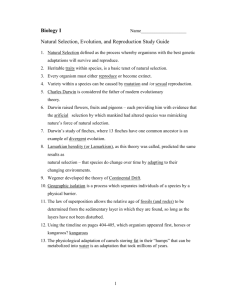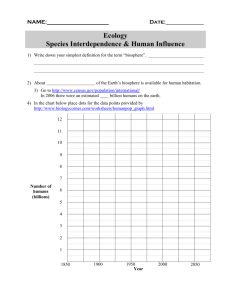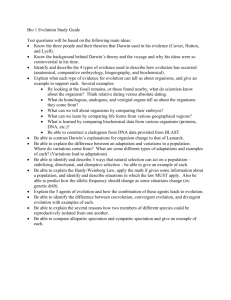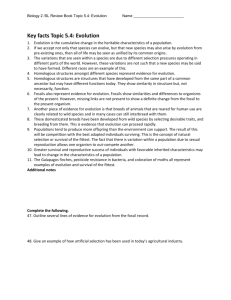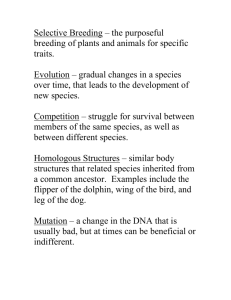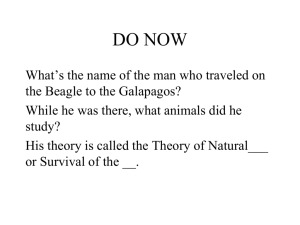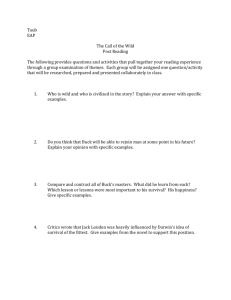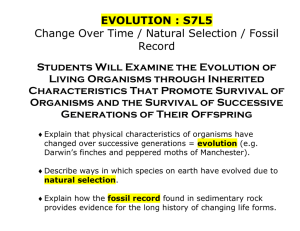KEY ENVIRONMENTAL BIOLOGY EVOLUTION REVIEW SHEET
advertisement
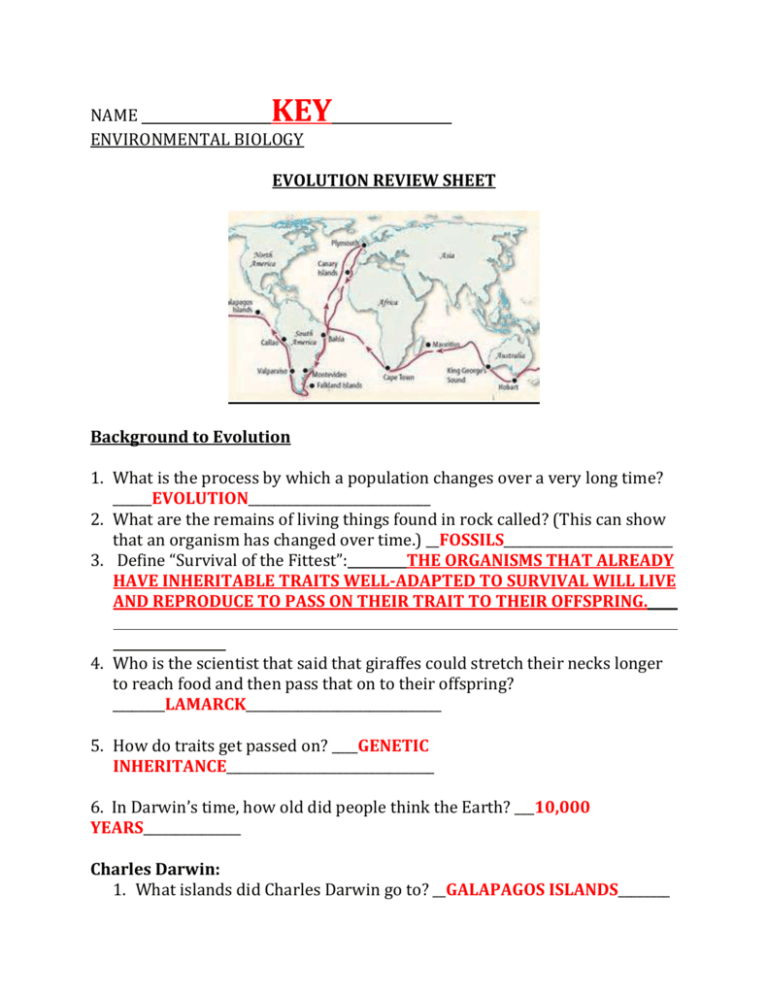
KEY NAME ENVIRONMENTAL BIOLOGY EVOLUTION REVIEW SHEET Background to Evolution 1. What is the process by which a population changes over a very long time? ______EVOLUTION____________________________ 2. What are the remains of living things found in rock called? (This can show that an organism has changed over time.) __FOSSILS__________________________ 3. Define “Survival of the Fittest”: THE ORGANISMS THAT ALREADY HAVE INHERITABLE TRAITS WELL-ADAPTED TO SURVIVAL WILL LIVE AND REPRODUCE TO PASS ON THEIR TRAIT TO THEIR OFFSPRING. 4. Who is the scientist that said that giraffes could stretch their necks longer to reach food and then pass that on to their offspring? ________LAMARCK______________________________ 5. How do traits get passed on? ____GENETIC INHERITANCE________________________________ 6. In Darwin’s time, how old did people think the Earth? ___10,000 YEARS_______________ Charles Darwin: 1. What islands did Charles Darwin go to? __GALAPAGOS ISLANDS________ 2. Name an organism that Darwin observed that had adaptations for their particular environment. ___FINCHES, TURTLES_______ 3. What was the name of Darwin’s book that described natural selection and evolution? ____ORIGIN OF SPECIES_________________ 4. Explain why survival of the fittest is not always survival of the strongest and give one example. ____________________________________________________________________________ ____SURVIVAL DEPENDS ONLY ON WHAT TRAITS ARE BEST FOR LIVING AND PASSING ON ADAPTATIONS THROUGH INHERITANCE. EX: SKUNKS HAVE SMELL TO REPEL PREDATORS- NOT STRONGEST, JUST STINKIEST! Which moths were the most common before the pollution from the Industrial Revolution?_____LIGHT MOTHS__________ 5. Which moths were the most common after the pollution on the trees from the Industrial Revolution?__DARK MOTHS______ 6. Did the color of the moth population change over time (re: “evolve”) ? ____THE MOTHS WITH THE COLOR BEST SUITED TO SURVIVE IN THEIR PARTICULAR ENVIRONMENT, PRODUCED MORE AND MORE MOTHS EACH GENERATION THAT ALSO INHERITED THE MOST SUITABLE COLOR FOR SURVIVAL.______ What are the 4 parts need for Natural Selection 1. 2. 3. 4. Variation Not all organisms will survive Adaptations/Survival of the Fittest Inheritance Evidence of Evolution Name 2 of the 6 types of evidence that show evolution AND explain how they support evolution. FOSSILS- COMPARE OLDER AND NEWER SPECIES OF BONES, OBSERVE CHANGES OVER TIME HOMOLOGOUS STRUCTURES- COMMON BONE STURCTURE SUPPORTS IDEA OF COMMON ANCESTOR FROM WHICH THEY EVOLVED GEOGRAPHIC DISTRIBUTION- SEE SIMILARITIES IN ORGANISMS SPREAD THROUGHOUT THE CONTINENTS OF THE WORLD, ETC. VESTIGIAL STRUCTURES- PARTS THAT FUNCTIONED IN ANCESTRAL SPECIES BUT NO LONGER SERVE A MODERN FUNCTION. SHOWS THAT ORGANISMS CHANGED OVER TIME. SIMILARITIES IN DEVELOPMENT- EMBRYOS OF VERTEBRATES DEVELOP AS EMBRYOS IN A SIMILAR MANNER DUE TO THEIR COMMON ANCESTOR DNA/MOLECULAR EVIDENCE- COMPARE SEQUENCE DIFFERENCES AMONG ORGANISMS. THE LESS THE DIFFERENCES, THE MORE CLOSELY RELATED 3. What are the structures called that a similar internal structure but have evolved to perform different functions? _____HOMOLOGOUS STRUCTURES__________ 4. What are “vestigial structures”? AND give an example STRUCTURES THAT HAD A FUNCTION IN ANCESTRAL SPECIES BUT NO LONGER FUNCTION IN MODERN SPECIES. EX: APPENDIX, NICTITATING MEMBRANE, TAIL BONE, WHALES HAVE HIP BONES_____________ 5. What are the structures that perform a similar function but are not from a recent common ancestor. They have come about due to similar environmental pressures. ______ANALOGOUS STRUCTURES_________________ 6. The chart compares the number of DNA bases that are DIFFERENT between organisms for a particular gene. Which organism in the chart are humans MOST closely related to (meaning they have a more recent common ancestor) _______PIG- 13 DIFFERENCES_______ 8. Organisms of closely related species also look similar during development. During which stage of development do they look most similar? ______EMBRYOS!____________ (hint: use picture below) 9. Explain how resistance to antibiotics has shown evidence of natural selection. ANTIBIOTICS ARE USED TO KILL BACTERIAL INFECTIONS. BACTERIA REPRODUCE VERY FREQUENTLY, AND AS A RESULT, MUTATIONS ARE QUITE COMMON. IF SOME BACTERIA EVOLVE AN ADAPTATION THAT MAKES THEM RESIST DYING FROM THE ANTIBIOTIC, THEN THEY WILL SRUVIVE TO REPRODUCE AND PASS ON THAT TRAIT TO THE NEXT GENERATIONS. IF THE SAME ANTIBIOTIC CONTINUES TO BE USED, EVENTUALLY IT WILL BE INEFFECTIVE. 10. Provide two organisms and an adaptation that has allowed them to survive in their environment EASY ENOUGH- REMEMBER THE PRESENTATIONS!
